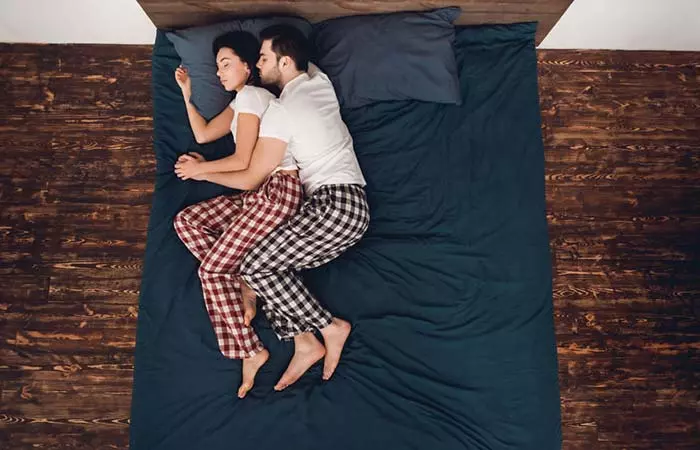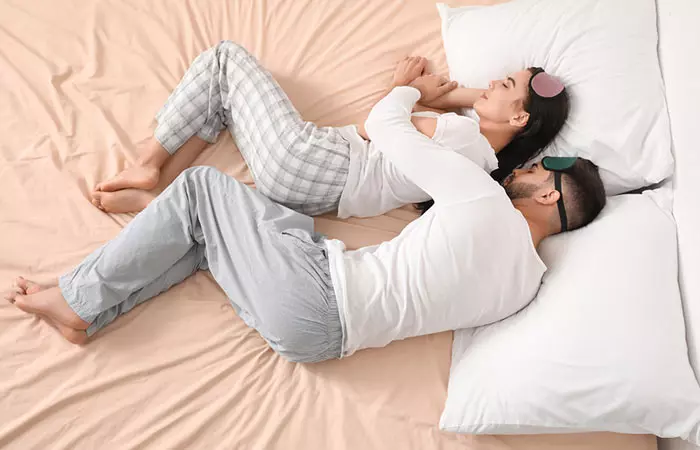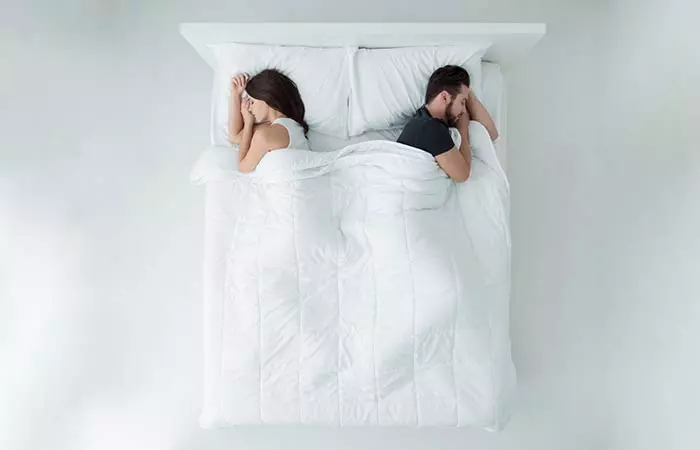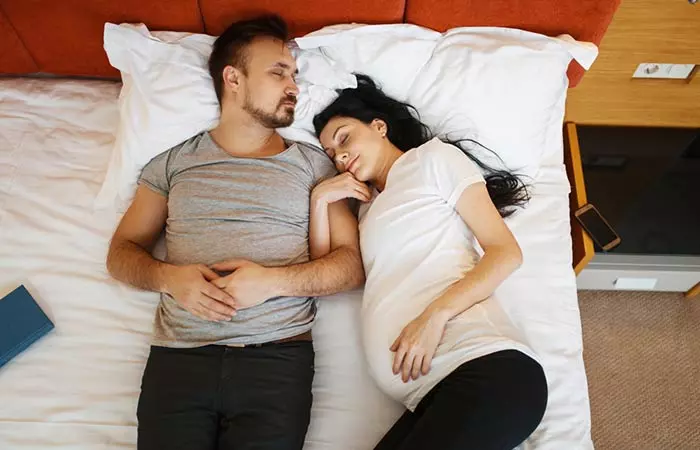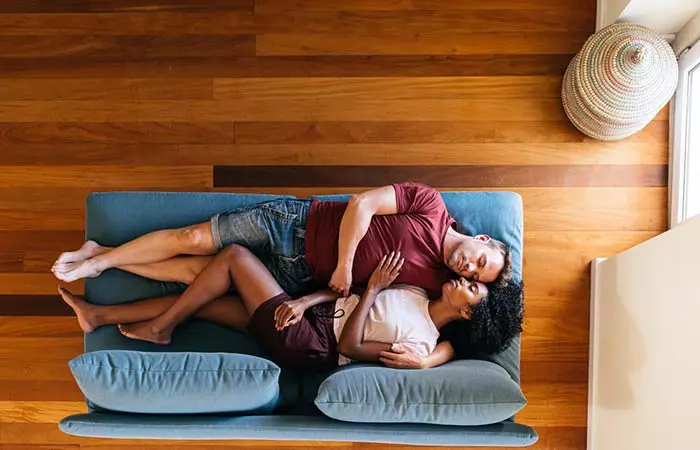26 Types Of Couple’s Sleeping Positions And What They Say About Your Relationship
Getting comfortable sleep can keep your relationship strong and amp up your intimacy.
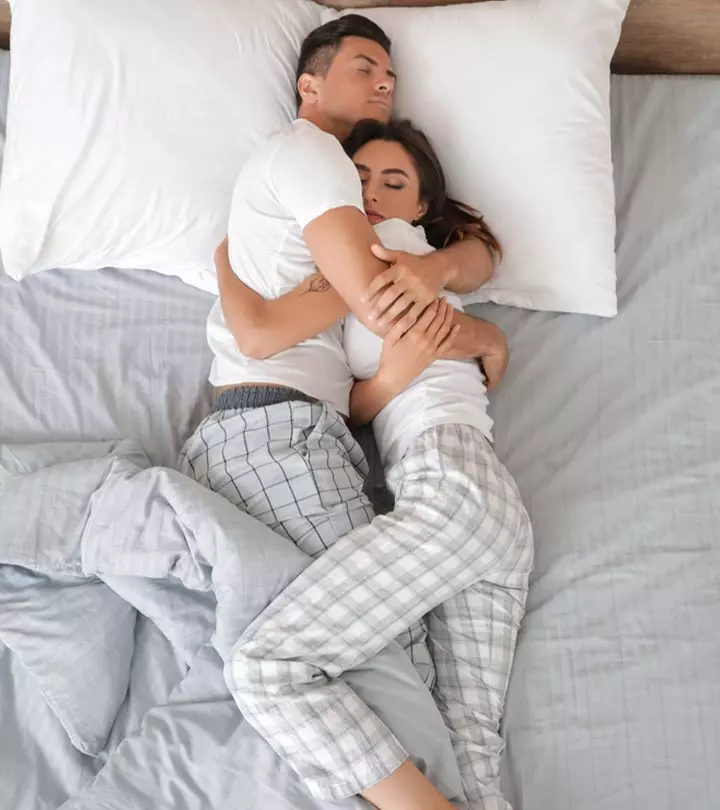
Image: Shutterstock
One of the most intimate moments in a relationship is when you fall asleep with your partner. A couple’s sleeping position can say a lot about their relationship too. However, do your sleeping positions really matter? This article delves deep into the 26 sleeping positions for couples, the meanings associated with each position, and how they build bedtime intimacy. Keep reading to decipher the meaning of your sleeping position.
In This Article
What Does Science Say About Sleeping Positions?
A study conducted in 2014 by the University of Hertfordshire with over a thousand participants showed that (1):
- 42% preferred sleeping back-to-back, 31% chose to sleep facing the same direction and 4% opted to sleep facing each other. This suggests that while most couples prefer having their own space, they also desire to be close to their partners.
- 12% of the couples slept an inch apart, while only 2% chose to sleep over 30 inches apart.
- 94% of the couples preferred falling asleep with some contact, indicating a happier relationship, while only 68% of couples preferred no contact.
- The study indicated that the further apart a couple spent in the night, the worse their relationship was. And 86% of the couples who slept less than an inch away from each other were in happy relationships.
- The study also found that most extroverts preferred sleeping close to their partners, while creative people slept on their left side.
While science does show us interesting findings, do understand that there is no single best sleeping position. Irrespective of the position, sleeping together seems to have major advantages. Learn more in the next section.
Is It Important To Sleep Together?
In a relationship, sleeping together is important (2). It allows you to be vulnerable and open to your partner.
- Oxytocin, also called the lover hormone or cuddle chemical, is released in the brain when you cuddle with your partner. The hormone makes you feel safe, relaxed, and empathetic.
- Some women and men feel more secure knowing that they have a partner sleeping with them. This could either be due to a sense of physical protection in case of a break in, or some other insecurities. Sleeping in pairs can improve emotional and physical bonding as well as security (2).
- Another study indicated that sleeping together and close sleeping proximity can improve a marriage.
- Another study showed that divorced women tend to have more sleeping disturbances than married women (4). This suggests that having a bed sharing partner may improve your sleep.
According to the graph, co-sleeping was associated with up to 10% more relative REM duration compared to sleeping alone (23 ± 0.9% vs. 21 ± 0.8%), and less fragmented REM sleep, resulting in longer, uninterrupted REM sleep sequences (23.0 ± 4.2% vs. 21.0 ± 4.2%; p = 0.005). This also suggests the subconscious trust and safety the partners associate with each other.
Improved REM Sleep In Couples Who Sleep Together
Source: Bed-Sharing in Couples Is Associated With Increased and Stabilized REM Sleep and Sleep-Stage SynchronizationHowever, if both individuals in the relationship have different schedules or work timings, they may find it better to sleep separately. This does not mean that their relationship is in peril. In fact, it could indicate that the couple is emotionally strong together and can handle their issues better.
We now look at the various positions couples sleep in and what they can mean about your relationship. Keep reading.
Types Of Couple’s Sleeping Positions And What They Mean
1. The Spoon
This is among the most common couple sleeping positions (5). Both partners sleep closely facing the same direction. The first person facing the direction is considered the little spoon, while the person on the outside is considered the bigger spoon.
This is a very comfortable sleeping position for most couples as it provides a sense of protection and closeness.
A study showed that as you grow older, most people prefer sleeping on the right side. This could be the reason for this position’s popularity (6).
The main issue with this position is that one or both partners might hunch while sleeping. This may lead to back and shoulder issues over time. Try not to hunch or fold your knees too high when sleeping in this position.
2. The Loose Spoon
This is a freer version of the spoon. While both partners sleep facing the same direction, they may keep a small distance between them. This allows both people to move around as they sleep.
This position signifies closeness and protection, while giving both partners some breathing space.
The main issue here is hunching as you sleep. Avoid bending your back or raising your knees too much.
3. The Chasing Spoon
This sleeping position is very similar to the spoon, except that the couple sleeps in the center of the bed, and at an angle. This gives the appearance of one person chasing the other (the runner).
A chasing spoon could mean that the partner that moves at the angle might want more space in the relationship, or desires to be chased after.
However, the runner in this position could simply be used to sleeping at angles, or moving around as they sleep. Often, slipping an arm around the runner prevents them from moving too much. It also provides a sense of security.
4. The Mirror (Face To Face)
This is when couples sleep facing each other, with little to no distance between them. The couple usually has some contact with each other.
The mirror sleeping position indicates a keen sense of trust, happiness, and dependence. It is normally noticed during the earlier stages of a relationship. As you get more comfortable with your partner, you might tend to sleep a few inches farther away from each other.
5. The Face To Face Without Touching
This is a position where couples face each other as they sleep. But there is some distance between them.
While distance might signal space issues, here it indicates comfort level. It signifies security in a relationship. Partners give each other space to breathe and move freely.
Also called the “pillow talk position,” this sleeping style means the couple are having a heart-to-heart discussion. They are more open to hearing each other.
6. The Butt-To-Butt
This back-to-back sleeping position is common among couples. Some part of the body, usually the lower back or butt, remains in contact with the partner.
The position indicates that while the couple may be close, the relationship may be a few months to a year old. It hints at a sense of security and trust. Each partner is comfortable enough to sleep facing away from each other.
This is a more comfortable way of sleeping as neither partner needs to hunch and sleep.
7. The Back-To-Back Without Touching
This is similar to the position above, except there is some space between the partners.
It typically shows growth in a relationship. Both partners are secure and comfortable with each other.
While this position might show comfort, it may also be the go-to position for a couple in a fight. This usually is indicated in the amount of space between the partners.
8. The Cradle
The cradle position is also commonly called the nuzzle. It is a go-to protective position. Here, one partner sleeps flat on their back, while the other rests their head against their partner’s chest. Normally, the person lying flat will have their arm around or over their partner.
This position is a very protective stance. It gives off a secure vibe. Sometimes, it also suggests that the protective partner (laying on their back) is comforting their significant other. It is also commonly the position taken after a time of passion.
Laying for too long in this position may leave the protective partner with stiff arms.
9. The Cliffhanger
In this position, both partners are on the opposite side of the bed with a lot of gap between them. This usually indicates a fight between the couple.
It could also mean that the couple is drifting apart. This could mostly be the case if the stance of the partners is closed off. If they sleep with their arms crossed, in a way that indicates they are protecting themselves, it could mean they are distancing themselves from each other.
If both partners like spreading the legs, this might be a comfortable position for them to sleep, irrespective of their relationship status.
10. Paper Dolls
Both partners lying on their backs just barely touching their fingers sort off resemble a row of paper dolls.
It shows that the couple are happy, co-dependent, and secure. They just touch fingers or hands, letting the other know that they are there for them while still giving them their space.
Laying on your back might relieve any back pain or shoulder aches. But make sure your pillow is in the right position to relieve any backaches.
11. Tetherball
This is the sleeping position of a very secure and mature couple. They give each other space to sleep in whatever position works for them individually. But there is so much physical contact between both. Either one stretches out their hand to their partner’s hip or back. Or sometimes one partner touches the other with their leg.
It takes some time to find a position that works for both people. It could also indicate that the couple started sleeping in the spoon position then unraveled into the tetherball.
12. The Leg Hug
When sleeping in the leg hug position, both partners sleep in their individual comfortable positions. But the legs of each partner are entwined. The legs might not be touching constantly but a few times throughout the night.
This indicates a comfortable and secure relationship. Both partners have spent enough time to be completely comfortable with each other. They touch without encroaching each other’s sleeping space.
13. Heart-On-The-Sleeve
The heart-on-the-sleeve position is also known as shingles, wherein one partner lays on their back, while the other rests their head on their shoulder. No couple can stay for too long in this position. It might leave the partner lying flat on their back with a stiff shoulder.
This position indicates intimacy and happiness. It may be preluded by a time of intimacy.
14. The Tummy Nap
This is also known as the stomach snooze. In this position, both partners sleep on their stomachs. Sleeping on your tummy usually indicates being closed off.
However, many people are used to sleeping on their tummies even though it is not healthy. It may pose a threat to your lumbar regions.
 Quick Tip
Quick Tip15. The Entwinement
As the name suggests, both partners sleep entwined together. This position is also called ”Tangled”. It does not leave both partners a lot of breathing room.
This position indicates a desire for relationship intimacy and growth. It is most commonly observed in new couple bonding. In more mature partnerships, the couple may start off in this sleeping position, though they may slowly move on to another position during the night.
16. The Unravel
The unravel or unraveling knot is a summon sleeping position in mature/growing relationships (typically relationships between the first year and above). In this sleeping position, the couple starts off entwined, but as the night progresses, moves apart into their own comfortable position.
This is a sign of a secure and mature relationship. The couple understands the need for physical contact, but they also give each other their own space. While the couple may seem dependent on each other, they are quite secure individually and in their relationship.
17. The Starfish
Spread out like a starfish, this is commonly seen in one partner rather than both. The significant other generally sleeps on one side of the bed, leaving the remaining space for their starfish partner.
While this indicates a level of comfort, it might sometimes be a problem for the other partner. They may feel restrained due to the movement of the starfish during sleep. It becomes worse if the starfish rotates or moves about as they sleep. It may hinder their partner’s peaceful rest.
 Quick Tip
Quick Tip18. The Stiff-Straight
Also called the soldier, both partners sleep straight keeping their arms firmly to the side (like soldiers). They may also fold their arms. This is seen in people who used to sleep as kids wrapped up in blankets to avoid falling over. As they grow up, they still sleep straight without the need for the blanket tuck.
This position indicates independence. Both partners sleep the way they please irrespective of the relationship status. It may also be seen in very new couples who are unsure of what to do next after intimacy. In some cases, it may also indicate a bad coital experience.
19. The Fetus
In a fetus sleeping position, one or both partners sleep in the fetal position with their knees raised high and close to the body. Their back may be hunched over as well.
Most people believe this is one of the best positions to achieve deep sleep. However, the fetal position may also be a sign of discomfort or insecurity.
Posture-wise, this is not a good position to sleep in. It may cause back, neck, shoulder, and joint pains.
20. The Arm Around
In this position, one or both the partners wrap an arm around the others. This allows both the partners to have some contact while spreading out in bed.
It indicates a secure and happy relationship, also depicting each other’s needs from one another.
21. The Together
The together sleeping style is about those partners who sleep very close together. There is constant contact between the partners.
It signifies a happy and comfortable relationship. Both partners enjoy each other and wish to be close. However, it may also be a sign of too much dependence on each other.
22. The Overhead
In an overhead position, both partners sleep on their stomach, but one partner tends to place their head over the other’s.
It might be a sign of protection and security in the relationship.
23. The Over-Body
In this position, one partner lays flat on their back, while the other rests most of their torso on them.
The position tends to indicate that one partner needs the attention and protection from the other. It is also a great way to snuggle and foster nighttime closeness.
24. The Underarm
An underarm position is when one partner sleeps a little above the other. One partner lies under the arm of another.
Both partners give each other enough room to sleep in their preferred position while staying close to each other.
25. The Arm
In this position, both partners sleep close together on their backs but one of their arms is always around the other. It can either be on the other partner’s head, around their shoulders, waist, or arm.
It shows that the couple is very comfortable with each other.
26. The Movers
There are some couples who don’t have a particular sleeping position. Then tend to move around a lot as they sleep, often changing positions through the night.
There needs to be a significant comfort level for both partners to be able to move around so much as they sleep, without hindering each other’s nap time.
Your sleeping positions influence your sleep patterns too. If you or your partner are not happy with your regular sleeping position, you may experience irregular sleep patterns. Here are a few things you can do to improve your sleep patterns.
Tips To Improve Your Sleep Patterns
- Couples that cohabit should sleep and wake up around the same time. Often, couples with different sleep schedules could interfere with each other. They tend to wake up when their special someone comes into bed late. To improve your sleep pattern, plan a fixed time for you two to sleep.
- In order to improve sleep quality, irrespective of the sleeping position, make sure you have a firm mattress and a pillow.
- Be open with your pattern! If there is something bothering you, talk things over with your partner. Never go to bed angry – chances are you’ll have irregular sleep that will ruin your mood further.
- Remember the “Hug And Roll” from Friends? Well, take some advice from Chandler’s experience and just be open with your partner. Tell them what positions you feel comfortable in, and find out how they prefer to sleep. Work out what suits best for both of you.
- Follow a regular schedule. While it might seem trivial, sticking to a schedule will benefit your sleeping pattern greatly. Your body becomes used to resting at a particular time.
- Social media is known to disrupt sleep (8). Avoid phones, television, or laptop distractions at least half an hour before you sleep. For best results, keep your phone, laptop, i-pad, and other devices off or on DND mode an hour before you sleep. Try to read a book instead. You may also lay in bed and just talk to your partner.
- Go to bed with a positive mindset. Talk positively before you sleep. You’ll be surprised at how well you sleep once you start doing this. Take a stroll down the memory lane and laugh at all the happy moments you’ve shared with your partner. With positive thoughts, your mind is at rest. You’ll see happier dreams.
- Stress will not let you sleep peacefully (9), (10). Try practicing meditation, yoga, or some stretches for half an hour to 45 minutes before you sleep. These exercises act as stress busters (11).
- Don’t fall asleep immediately after you eat. You’ll feel very heavy after you eat. You might not get good sleep. Head out for a stroll with your partner. You may also just dance around at home.
- Keep a glass of water at room temperature on your bedside table. If you or your partner wake up feeling thirsty or with a dry throat, you don’t need to get up and walk to the kitchen or fridge. You may instead take a quick sip of the water and get back to sleep.
- If you do wake up in the middle of the night for no reason, don’t look through your phone and other devices. Try to go back to sleep. Often, when you wake up and look through your phone in the middle of the night, your partner’s sleep might be hindered, too.
- It’s true that we all need to think of ourselves. But in a relationship, we need to be aware of our partner’s needs as well. This is especially true with sleeping positions. Don’t take up most of the bed space only to leave your partner with little room to bundle up and sleep in. Your partner is essentially your other half, so give them half the bed!
- Let’s be honest – when you’re sleeping you have no control over your bodily functions. Most of us have no control over how our limbs move. You might think you’re sleeping like an angel but in reality, you might be kicking your partner off the bed. If this continues for days, consult a somnologist.
- Play some relaxation sound or music as you sleep. Research shows that music prevents any internal or external stimulus that affects sleep (12 ). Playing music that your partner and you enjoy may help you sleep better.
- Make sure neither you nor your partner drinks coffee before you sleep (13). Caffeine hinders sleep and keeps you in a state of alertness.
- Did you know that consumption of excess alcohol and drugs like LSD and ecstasy can disrupt your sleep and cause you to wake up (Don’t get drunk or high before you sleep.
- While many people like tracking their sleep, the habit may also cause sleep disturbances (15). Using sleep trackers causes more anxiety, leading to irregular sleep schedules. Make sure you have no devices on or around you or your partner.
Infographic: What Do Your Sleeping Positions Say About You As A Couple?
Sleeping positions can reveal a lot about a couple’s chemistry. Oxytocin, the love hormone, is released when partners sleep together, giving them a sense of security and relaxation. They portray the love, security, protectiveness, and yearning between a couple. Check out the infographic below to discover what your couple’s sleeping position means.

Illustration: StyleCraze Design Team
Sleeping positions can speak volumes about the dynamic between a couple. Sleeping or resting together helps release oxytocin, the love hormone, and makes the partners feel secure and relaxed. According to studies, 94% of couples prefer falling asleep with some contact, pointing toward a healthy bond. Therefore, couples that sleep apart can be indicative of a troubled relationship. Different sleeping positions, including The Spoon, The Mirror, The Cradle, reflect how both partners feel for each other. For instance, a Leg hug showcases a comfortable and secure relationship, while the Entwinement points toward the desire for intimacy.
Frequently Asked Questions
Why does my boyfriend want to sleep on my thighs?
If your partner sleeps on your thighs it may indicate that they feel comfortable around you and trust you. You make them feel safe or they are trying to express their attraction towards you.
Do most couples cuddle at night?
Individuals and time play a role. Cuddling may not be for everyone, as some couples need their own space as well and don’t like to cuddle all the time or every night.
What happens when couples stop sleeping together?
When couples stop sleeping together, it can negatively affect their relationship. The lack of physical intimacy can result in emotional distance, resentment, and loneliness. It can also lead to decreased trust and communication, as well as an increase in arguments. Not sharing a bed can negatively impact a couple’s sex life and overall satisfaction with the relationship.
Key Takeaways
- A couple’s sleeping positions may give insights into a couple’s life.
- In a relationship, sleeping together is important as it allows you to be vulnerable and open with your partner.
- If your sleeping positions don’t work together, take some time to figure out what works best for you two.

Image: Stable Diffusion/StyleCraze Design Team
Craving some quality sleep with your partner? Check out this video for the best sleeping positions with your partner for some sound and peaceful sleep together.
Read full bio of Hemali Adhiya
Read full bio of Subhrojyoti Mukherjee
Read full bio of Sangita Goel








